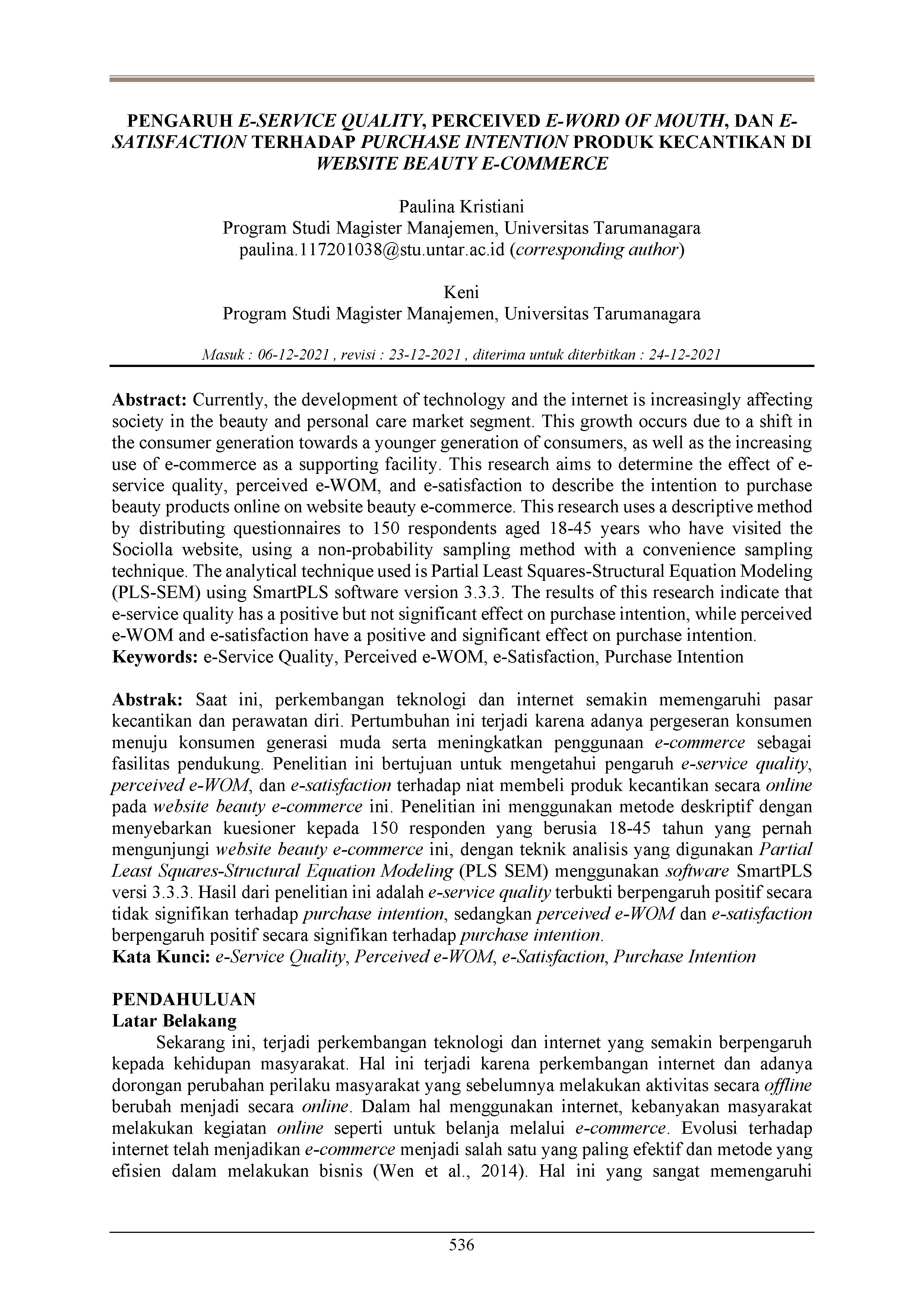Pengaruh e-Service Quality, Perceived e-Word of Mouth, dan e-Satisfaction terhadap Purchase Intention Produk Kecantikan di Website Beauty e-Commerce
Main Article Content
Abstract
Currently, the development of technology and the internet is increasingly affecting society in the beauty and personal care market segment. This growth occurs due to a shift in the consumer generation towards a younger generation of consumers, as well as the increasing use of e-commerce as a supporting facility. This research aims to determine the effect of e-service quality, perceived e-WOM, and e-satisfaction to describe the intention to purchase beauty products online on website beauty e-commerce. This research uses a descriptive method by distributing questionnaires to 150 respondents aged 18-45 years who have visited the Sociolla website, using a non-probability sampling method with a convenience sampling technique. The analytical technique used is Partial Least Squares-Structural Equation Modeling (PLS-SEM) using SmartPLS software version 3.3.3. The results of this research indicate that e-service quality has a positive but not significant effect on purchase intention, while perceived e-WOM and e-satisfaction have a positive and significant effect on purchase intention.
Saat ini, perkembangan teknologi dan internet semakin memengaruhi pasar kecantikan dan perawatan diri. Pertumbuhan ini terjadi karena adanya pergeseran konsumen menuju konsumen generasi muda serta meningkatkan penggunaan e-commerce sebagai fasilitas pendukung. Penelitian ini bertujuan untuk mengetahui pengaruh e-service quality, perceived e-WOM, dan e-satisfaction terhadap niat membeli produk kecantikan secara online pada website beauty e-commerce ini. Penelitian ini menggunakan metode deskriptif dengan menyebarkan kuesioner kepada 150 responden yang berusia 18-45 tahun yang pernah mengunjungi website beauty e-commerce ini, dengan teknik analisis yang digunakan Partial Least Squares-Structural Equation Modeling (PLS SEM) menggunakan software SmartPLS versi 3.3.3. Hasil dari penelitian ini adalah e-service quality terbukti berpengaruh positif secara tidak signifikan terhadap purchase intention, sedangkan perceived e-WOM dan e-satisfaction berpengaruh positif secara signifikan terhadap purchase intention.
Article Details
Section

This work is licensed under a Creative Commons Attribution-NonCommercial-ShareAlike 4.0 International License.
This work is licensed under a Jurnal Manajemen Bisnis dan Kewirausahaan Creative Commons Attribution-ShareAlike 4.0 International License.
How to Cite
References
Bataineh, A. Q. (2015). The impact of perceived e-WOM on purchase intention: The mediating role of corporate image. International Journal of Marketing Studies, 7(1), 126–137. https://doi.org/10.5539/ijms.v7n1p126
Carlson, J., & O’Cass, A. (2010). Exploring the relationships between e-service quality, satisfaction, attitudes and behaviours in content-driven e-service web sites. Journal of Services Marketing, 24(2), 112–127. https://doi.org/10.1108/08876041011031091
Gounaris, S., Dimitriadis, S., & Stathakopoulos, V. (2010). An examination of the effects of service quality and satisfaction on customers’ behavioral intentions in e-shopping. Journal of Services Marketing, 24(2), 142–156. https://doi.org/10.1108/08876041011031118
Ha, S., & Stoel, L. (2012). Online apparel retailing: Roles of e-shopping quality and experiential e-shopping motives. Journal of Service Management, 23(2), 197–215. https://doi.org/10.1108/09564231211226114
iPrice. (2021). Peta e-commerce Indonesia. iPrice Insights. https://iprice.co.id/insights/mapofecommerce/
Kim, J. H., & Lennon, S. J. (2010). Information available on a web site: Effects on consumers’ shopping outcomes. Journal of Fashion Marketing and Management, 14(2), 247–262. https://doi.org/10.1108/13612021011046093
Liu, F., Xiao, B., Lim, E. T. K., & Tan, C. W. (2017). The art of appeal in electronic commerce: Understanding the impact of product and website quality on online purchases. Internet Research, 27(4), 752–771. https://doi.org/10.1108/IntR-09-2016-0280
Pratiwi, S. A., & Dewi, C. K. (2016). Pengaruh e-service quality terhadap behavior intentions dengan e-satisfaction sebagai mediator (Studi pada Kriya.co.id). Jurnal Computech & Bisnis, 10(2), 59–71. https://jurnal.stmik-mi.ac.id/index.php/jcb/article/view/147/170
Statista. (2020). Beauty & personal care - Indonesia. Statista. https://www.statista.com/outlook/cmo/beauty-personal-care/indonesia
Wen, C., Prybutok, V. R., Blankson, C., & Fang, J. (2014). The role of E-quality within the consumer decision making process. International Journal of Operations & Production Management, 34(12), 1506–1536. https://doi.org/10.1108/IJOPM-07-2013-0352
Yusuf, A. S., Che Hussin, A. R., & Busalim, A. H. (2018). Influence of e-WOM engagement on consumer purchase intention in social commerce. Journal of Services Marketing, 32(4), 493–504. https://doi.org/10.1108/JSM-01-2017-0031


